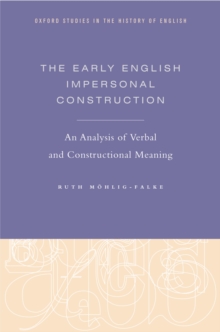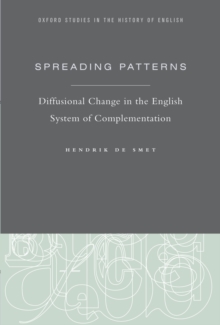
Constructions and Environments : Copular, Passive, and Related Constructions in Old and Middle English Hardback
by Peter (Postdoctoral Fellow, Postdoctoral Fellow, KU Leuven) Petre
Part of the Oxford Studies in the History of English series
Hardback
Description
This monograph presents the first comprehensive diachronic account of copular and passive verb constructions in Old and Middle English.
The mysterious loss of the high-frequency verb weorthan 'become' is explained as a casualty of changing word order in narrative during Middle English.
The merger of is 'is' and bith 'shall be, is generally' into a single suppletive verb is related to the development of a general analytic future shall be.
The co-occurrence of multiple changes led to become and wax crossing a threshold of similarity with existing copulas, from which they analogically adopted full productivity in one fell swoop.
In explaining each of these changes, the book goes beyond the level of the verb and its complements, drawing attention to analogical networks and the importance of a verb's embeddedness in clausal and textual environments.
Using a radically usage-based approach, treating syntax as emerging from (changing) frequencies, Peter Petré draws attention to general principles of constructional change, including but not limited to grammaticalization and lexicalization.
He proposes novel parallelisms between linguistic and ecological evolution.
Going beyond the view of language change as propagating only in social interaction, Petré explains how each individual's mental grammar can be seen as a dynamic ecosystem with hierarchical environments (clausal niches, textual habitats).
In this view, the interconnectedness of seemingly unrelated changes, itself resulting from cognitive economy principles, is arguably more decisive in lexical change than is functional competition.
Information
-
Out of stock
- Format:Hardback
- Pages:320 pages, 14 b&w line drawings
- Publisher:Oxford University Press Inc
- Publication Date:07/08/2014
- Category:
- ISBN:9780199373390
Information
-
Out of stock
- Format:Hardback
- Pages:320 pages, 14 b&w line drawings
- Publisher:Oxford University Press Inc
- Publication Date:07/08/2014
- Category:
- ISBN:9780199373390










